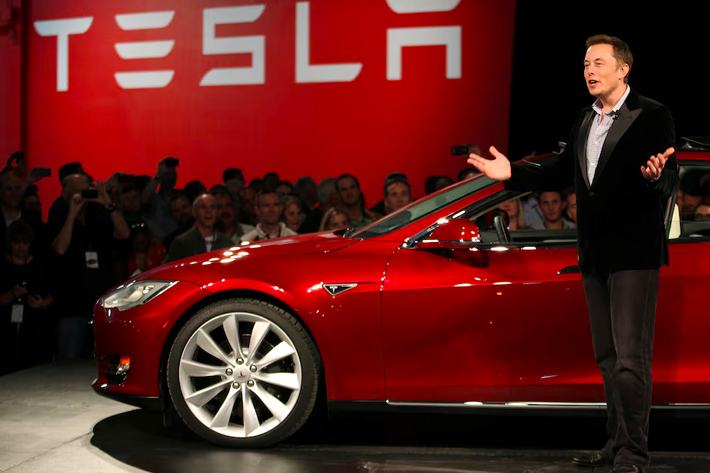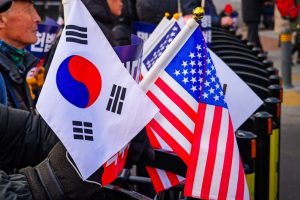Tesla has signed a $4.3 billion deal with South Korea’s LG Energy Solution (LGES) to supply the EV-maker with energy storage system batteries, a source has revealed.
Elon Musk’s company is keen to cut its reliance on Chinese imports due to tariffs imposed by the Trump Administration, a source told Reuters.
The Korean battery firm will supply lithium iron phosphate (LFP) batteries from its US factory in Michigan, the person said on condition of anonymity because the details were not public.
ALSO SEE: China’s Leaders Keen to End Vicious Price Wars, Curb Deflation
LGES announced earlier on Wednesday it had signed a $4.3 billion contract to supply LFP batteries over three years globally, without identifying the customer or saying if they would be used in vehicles or energy storage systems.
The South Korean company said last week it would try to offset sluggish electric vehicle demand by increasing sales of storage batteries thanks to a global surge in demand for power driven by data centres to train artificial intelligence.
“In accordance with our agreement, we are unable to disclose the customer’s identity due to confidentiality obligations,” LGES told Reuters. Tesla did not immediately respond to a request for comment.
Tesla chief financial officer Vaibhav Taneja said in April that US tariffs had an “outsized” impact on its energy business, since it sources LFP batteries from China.
“We will also be working on securing additional supply chain from non-China-based suppliers, but it will take time,” he said.
Tesla to buy Samsung chips
Tesla this week also announced a $16.5 billion deal to buy chips from Samsung Electronics’ factory in Texas as South Korean companies expand their US presence to meet local demand.
Three South Korean cabinet-level officials met US Commerce Secretary Howard Lutnick in Washington in a push to close a trade deal ahead of an August 1 deadline for 25% tariffs on US imports from South Korea to kick in, Seoul said on Wednesday.
LGES is one of the few US producers of LFP batteries, a battery chemistry long dominated by Chinese rivals that have little presence in the US market.
It started production of LFP batteries at its Michigan factory in May. The company said it was considering converting some electric vehicle battery production lines in the United States to cater to energy storage systems in response to slowing EV demand.
LGES said the contract would last from August 2027 to July 2030 and included an option to extend the deal period by up to seven years and to increase supply volumes depending on discussions with its customer.
“Other players, including South Korean firms like Samsung SDI and SK On, have yet to enter the US LFP market, allowing LGES to enjoy a first-mover advantage,” said Cho Hyun-ryul, a senior analyst at Samsung Securities. “While rivals have announced plans, LGES remains the only one actively producing at scale.”
Tesla’s energy businesses doing well
Tesla’s energy storage and generation business accounts for just over 10% of its revenue but it has been a bright spot for the company as it struggles with slowing car sales and upcoming cuts to US government support for EVs.
“Energy is growing really well despite headwinds from tariffs and various supply chain challenges,” Tesla CEO Elon Musk said on an earnings call last week. “I think not that many people appreciate just how gigantic the scale of battery demand is.”
Tesla has said its first LFP cell manufacturing facility will be online by the end of the year, but the in-house factory in Nevada will likely account for a small portion of its demand.
Lifeline for Samsung in US
Meanwhile, shares in Samsung Electronics eked out small gains on Tuesday, following a sharp rally the previous day after the South Korean tech giant clinched the $16.5 billion deal to supply artificial intelligence chips to Tesla.
Analysts said the agreement could bolster the company’s unprofitable contract manufacturing business, but Samsung faces challenges in securing additional large customers both for logic chips and memory chips where it struggles against TSMC and SK Hynix.
“This new deal breathes some much-needed life into the business and may signal the start of a turning point for Samsung, but its memory business will need to make considerable progress too,” Ben Barringer, global technology analyst at Quilter Cheviot, said.
Samsung Electronics, the world’s top memory chip maker, has suffered delays in supplying the latest high-bandwidth memory (HBM) chips to key US customer Nvidia, a setback that has dented its profits and weighed on its stock.
In its “foundry” or contract manufacturing business, where it manufactures logic chips designed by customers, Samsung remains a distant second to market leader TSMC.
“Whether this will open the door for additional large customers will depend heavily on its execution,” Barringer said.
Meanwhile, Samsung Electronics chairman Jay Y Lee departed for Washington on Tuesday. A Yonhap News Agency report said he was expected to support trade talks between South Korea and the US, but a company spokesperson, when contacted by Reuters, described it as “business trip”, with no further details.
While South Korea has been promoting partnerships in chips and shipbuilding with the US, a trade official said the Tesla deal was unrelated to ongoing trade talks aimed at reducing US tariffs. Analysts, however, said the deal could enhance prospects for Samsung’s investments in its Texas-based new chip factory.
Chips for cars, robots, data centres
Tesla CEO Elon Musk said on Sunday that Samsung’s new chip factory in Taylor, Texas, would make the auto company’s next-generation AI6 chips, likely to be used in self-driving cars, humanoid robots and data centres, without elaborating on the timing of the production.
The deal comes as Samsung has struggled to win major customers for its new Texas factory, partly due to low production yields of its cutting-edge chips.
“There also has to be a chance that the company was able to strike the long-term deal on favourable terms, given that Samsung needed to prove its contract manufacturing capabilities,” said Russ Mould, investment director at AJ Bell.
The long-term supply deal for a key technology from a US factory would “lessen the risk of supply-chain dislocations or tariff friction,” he said.
“Samsung now needs to prove it can deliver in the right volume to the right quality for what is likely to be a demanding customer.”
While the deal is “more about securing the longer-term future, we won’t see these in cars for at least a year or two,” said Matt Britzman, senior equity analyst at Hargreaves Lansdown.
- Reuters with additional editing by Jim Pollard
ALSO SEE:
Samsung Profit Seen Falling Amid Difficulties at New US Chip Plant
Tesla’s China-Made EV Sales Slump For Eighth Consecutive Month
Tesla Planning Cheaper, Smaller Model Y to Boost China Sales
Tesla Launches Free Trial of Full Self-Driving Service in China
Samsung Sorry for ‘Shock’ Profit Drop Amid AI Chip Struggles
Indonesia’s First EV Battery Plant Launched by Hyundai, LGES
LG Energy Solution IPO Set To Raise Close To $11bn
























